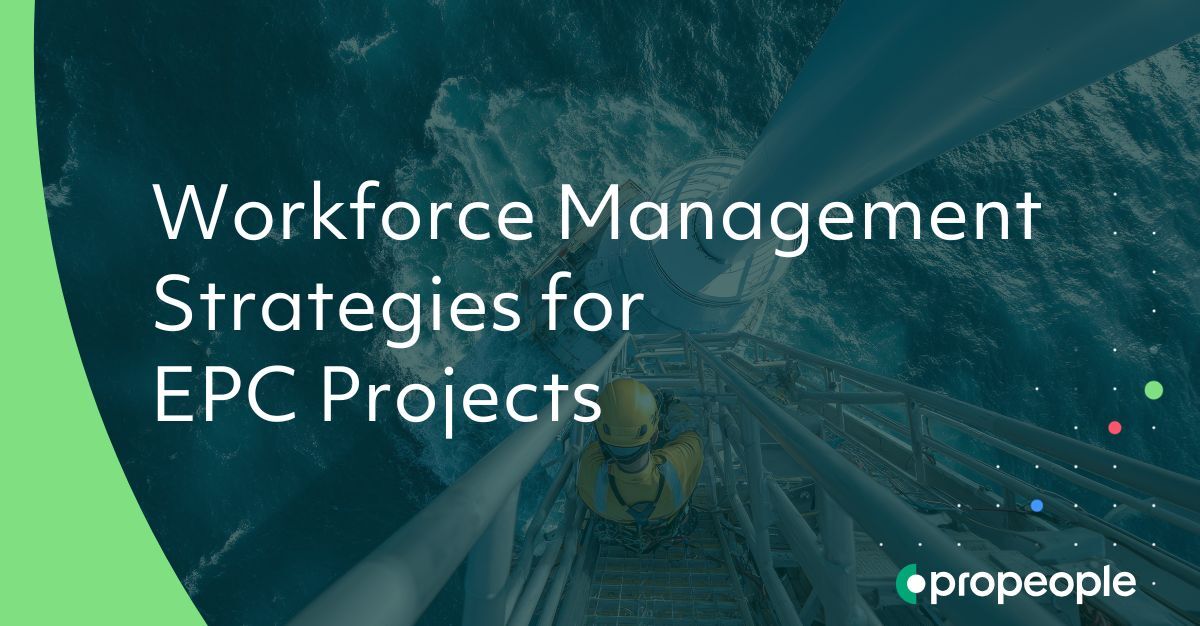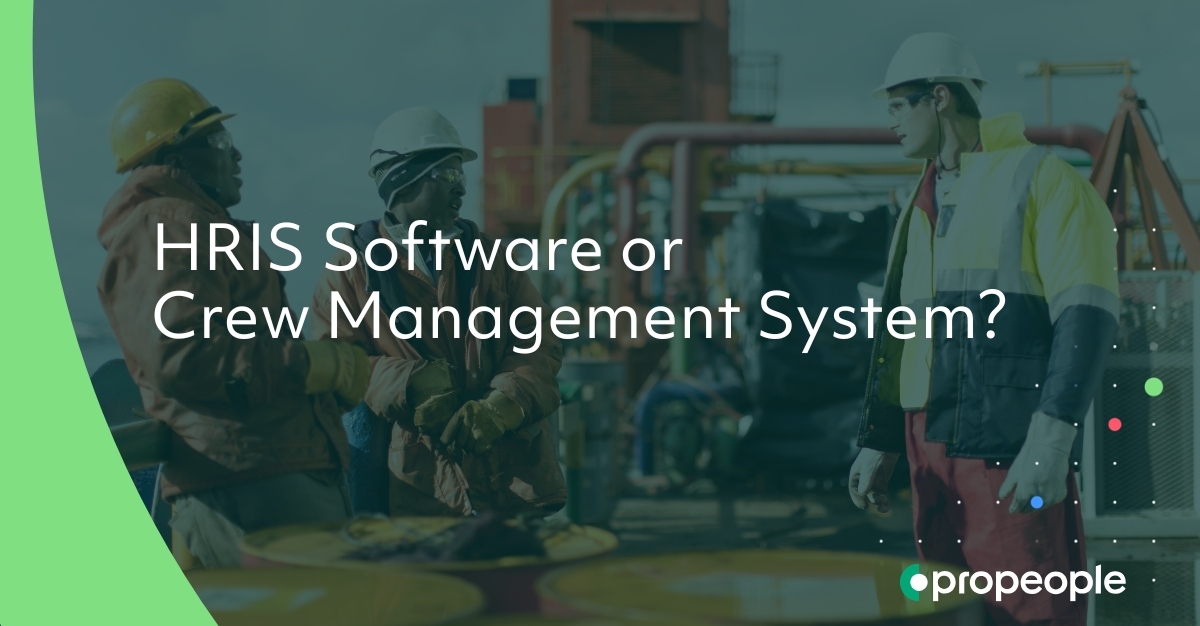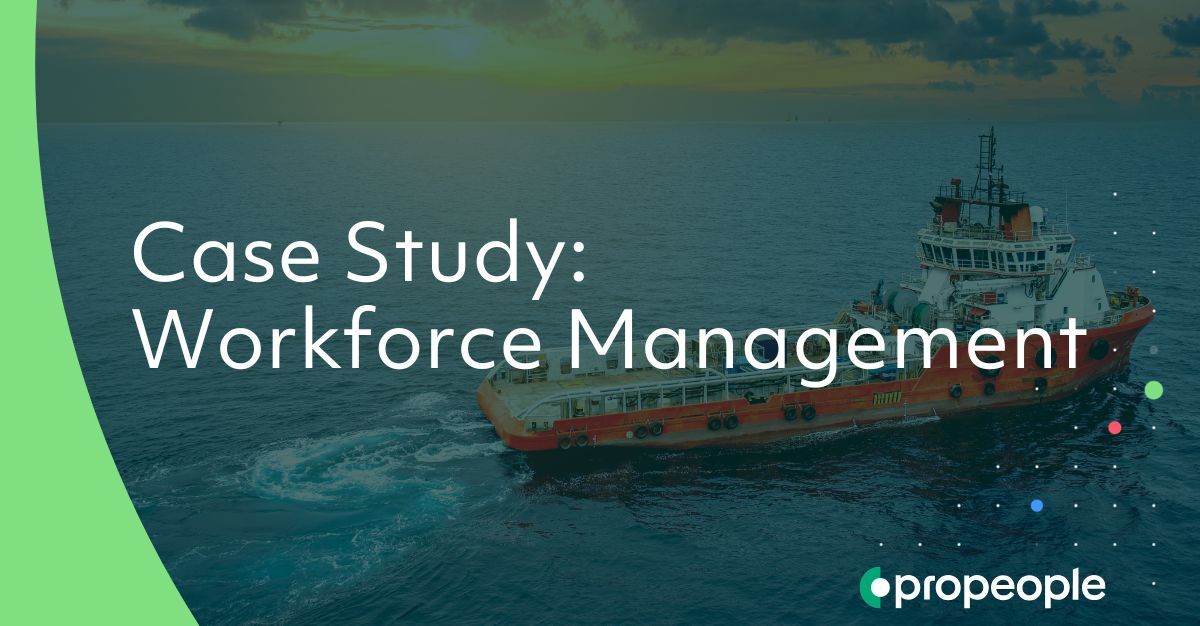
How Do Competency Management Systems Simplify Offshore Crew Scheduling?
Even a 1% improvement in offshore crew scheduling efficiency can save hundreds of thousands of dollars per vessel per year. Many EPC teams continue to use familiar spreadsheet-based processes, which can make it harder to manage credentials efficiently and maintain compliance, potentially leading to avoidable delays. A modern system like Propeople Crew Management software centralises crew competency and certification tracking, integrates with HRIS and LMS, and delivers real-time dashboards. Keep reading to discover how it streamlines planning, ensures compliance, and saves on costs.
Contents
- What is a Competency Management System?
- The Risks of Scheduling Unqualified Crew for Offshore Operations
- Benefits of Using a Competency Management System for Offshore Crews
- How EPC Teams Can Use a Competency Management System Effectively
- Summary: Why a Competency Management System is a Must-Have for Offshore Success
- FAQs: Competency Management Systems
What Is a Competency Management System?
A competency management system (CMS) is a centralised platform that captures, validates, and manages every crew member’s skills, certifications, and training records. It ensures real-time visibility into workforce readiness and enforces compliance-driven scheduling rules so that only qualified personnel fill specialised or high-risk roles.
“The aim of a Competency Management System (CMS) is to provide a consistent, comprehensive, safe, and structured process, by which an individual's competence to carry out or impact “Safety Related Systems” and “Safety Critical Tasks” is assured.”
Key Features and Functions of a Competency Management System
- Requirement mapping: Defines role, project, and regional competency criteria, automatically flagging gaps.
- Certification tracking: Centralises credential records with automated expiry alerts and self-service updates.
- Scheduling integration: Links competency data to planning tools for compliance-based assignment restrictions.
- Forecasting dashboards: Visualises crew readiness, vacancies, and upcoming skill shortages.
- Audit trail: Logs every change and user action for digital, audit-ready compliance reporting.
How It Differs from Traditional Tools Used to Track Competency
Unlike traditional tools like spreadsheets and siloed databases, a modern, digital competency management system automates validation, offers live dashboards, and integrates seamlessly with HRIS, LMS, and scheduling software. It transforms reactive, error-prone processes into proactive, efficient workforce planning.
The Risks of Scheduling Unqualified Crew for Offshore Operations
Scheduling unqualified personnel for offshore oil and gas operations can lead to serious legal, financial, and operational consequences. Across jurisdictions, the risks include:
Regulatory Penalties and Fines
Most countries enforce offshore crew compliance through national legislation aligned with international conventions such as the STCW Convention (Standards of Training, Certification and Watchkeeping for seafarers) and the Maritime Labour Convention (MLC). These frameworks require that all crew members hold valid, role-specific certifications and undergo regular training.
Failure to comply can result in:
- Fines and sanctions from national maritime authorities
- Port State Control detentions
- Suspension of operating licenses
Incidents of Noncompliance (INCs)
Regulators may issue formal notices or compliance orders when safety standards are breached. These can escalate to:
- Temporary suspension of operations
- Mandatory audits or inspections
- Increased scrutiny for future permits
Repeated violations often trigger more severe enforcement actions, including reputational damage and loss of contracts.
Legal Liability and Lawsuits
Under international maritime law, employers are legally obligated to provide a safe working environment. If an unqualified crew member causes an incident, the company may face:
- Civil liability under national laws
- Claims under the MLC, which protects seafarers’ rights to safe working conditions, medical care, and repatriation
- Insurance complications or denial of coverage due to noncompliance
Operational Shutdowns
In severe cases, regulators can shut down entire offshore facilities until compliance is restored, leading to millions in lost production and delays.
Benefits of Using a Competency Management System for Offshore Crews
 Implementing a modern competency management software like Propeople Crew Management Software revolutionises offshore crew scheduling by delivering real-time visibility into qualifications, robust certification tracking, and comprehensive crew competency tracking.
Implementing a modern competency management software like Propeople Crew Management Software revolutionises offshore crew scheduling by delivering real-time visibility into qualifications, robust certification tracking, and comprehensive crew competency tracking.
The key benefits include:
Immediately Detect Skill Gaps
Propeople’s requirement module enables team members to map role, project, and regional standards within a unified dashboard, giving planners a clear operational view of each crew member’s competencies. Planners can instantly search for suitable candidates for upcoming assignments and identify competency gaps tied to planned activities. This live insight replaces manual lookups and supports informed offshore crew scheduling decisions, ensuring they are always based on accurate, up-to-date data.
Stay Up to Date on Expiring Certifications
With Propeople’s LMS integration, completed trainings are recorded in the system, and any missing or expiring credentials are flagged without manual input. This gives managers a clear view of compliance gaps in advance, while self-service portals allow crew members to update their records directly. This results in fewer last-minute staffing issues and less reliance on spreadsheets to track training status.
Improved Compliance and Audit Readiness
Propeople maintains a digital audit trail through its detailed change log, recording who made each update and when. Its hierarchical requirement matrix lets you group standards by position, project, or region, while centralised records support POB (Persons on Board) reports and requirement analyses. Auditors gain instant access to proof of compliance with ISO, IADC, or custom standards, minimising the risk of fines or reputational damage.
Reduced Downtime
By linking competency data to planning tools like Mpower and HRIS, Propeople enforces scheduling restrictions based on live qualifications. Graphical forecasting dashboards highlight vacancies and forecast skill shortages, enabling you to schedule training alongside assignments in the same calendar. The result is fewer assignment conflicts, lower stand-by costs, and smoother project progression.
How EPC Teams Can Use a Competency Management System Effectively
Successfully deploying a competency management software requires thoughtful integration and user engagement. By aligning the platform with existing HR and project tools and following structured onboarding practices, EPC teams can unlock real-time insights and drive seamless offshore crew scheduling.
Integration with Existing HR and Project Systems
Synchronise crew data
Keep crew data consistent by syncing from your source system directly into Propeople: no manual imports, no duplication. We integrate with the platforms you rely on to keep data accurate and up to date.
Automate training records
Link your LMS to flow completed courses directly into Propeople. Credentials update instantly, and expiry alerts trigger without spreadsheets.
Embed into planning tools
Plan smarter and control costs by connecting Propeople and Mpower; align labour planning, timesheets, and budget impact in one view
Best Practices for Onboarding and Adoption
Define requirements up front
Use Propeople’s requirement module to map role-, project-, and region-specific standards. Involve operations, HR, and safety teams to confirm criteria and alert thresholds.
Run a pilot cohort
Start with one crew or small project team. Appoint “power users” to test alerts, dashboards and self-service portals, then capture feedback for tweaks.
Deliver hands-on training
Host short workshops on searching for qualified candidates, interpreting forecasting dashboards and acting on automated notifications.
Establish a continuous improvement loop
Review usage metrics monthly. Refine requirement hierarchies as project scopes change and encourage crew to update their own records via mobile or web self-service.
Summary: Why a Competency Management System is a Must-Have for Offshore Success
In offshore EPC projects, unpredictability, compliance demands, and tight deadlines leave no room for guesswork. Propeople Crew Management Software centralises crew qualification data, automates certification tracking and enforces compliance, and transforms reactive scheduling into proactive planning. By integrating seamlessly with HRIS, LMS and planning tools, it minimises downtime, prevents audit failures and keeps projects on track.
Want to learn more about how Propeople aids competency management? Register for our upcoming webinar to see our software in action.
FAQs: Competency Management Systems
-
Traditional spreadsheets and siloed databases rely on manual updates, leading to errors and outdated records. A competency management system centralises all skills and certification data, automates expiry alerts, and enforces scheduling restrictions in real time—eliminating guesswork and reducing administrative overhead.
-
Look for seamless connections with your HRIS (to synchronise headcount), LMS (to auto-import training completions) and scheduling tools like Mpower (to block unqualified personnel). These integrations ensure live competency data drives crew assignments without manual hand-offs.
-
It maintains a digital audit trail with detailed change logs and hierarchical requirement mappings (by position, project, or region). Centralised records and POB reports provide instant proof of compliance with ISO, IADC or custom standards—minimising the risk of fines and reputational damage.





